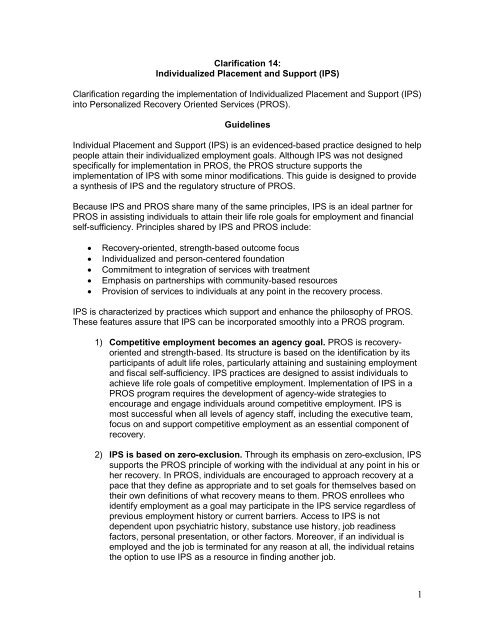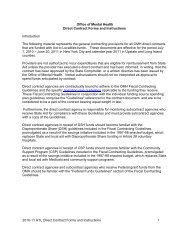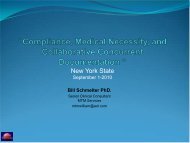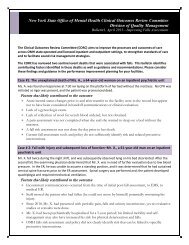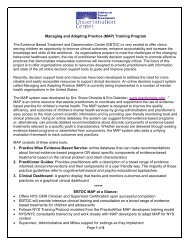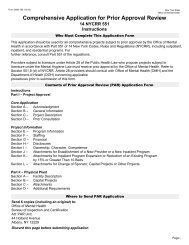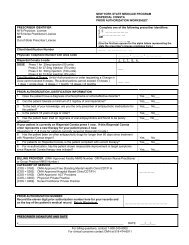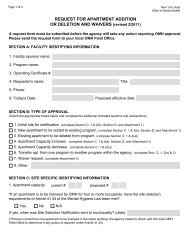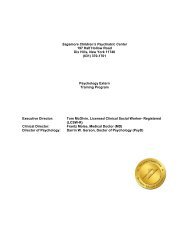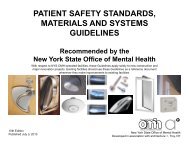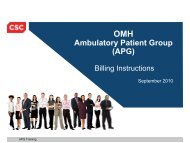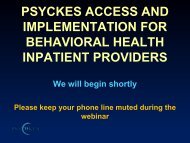Clarification 14 - Office of Mental Health - New York State
Clarification 14 - Office of Mental Health - New York State
Clarification 14 - Office of Mental Health - New York State
You also want an ePaper? Increase the reach of your titles
YUMPU automatically turns print PDFs into web optimized ePapers that Google loves.
<strong>Clarification</strong> <strong>14</strong>:<br />
Individualized Placement and Support (IPS)<br />
<strong>Clarification</strong> regarding the implementation <strong>of</strong> Individualized Placement and Support (IPS)<br />
into Personalized Recovery Oriented Services (PROS).<br />
Guidelines<br />
Individual Placement and Support (IPS) is an evidenced-based practice designed to help<br />
people attain their individualized employment goals. Although IPS was not designed<br />
specifically for implementation in PROS, the PROS structure supports the<br />
implementation <strong>of</strong> IPS with some minor modifications. This guide is designed to provide<br />
a synthesis <strong>of</strong> IPS and the regulatory structure <strong>of</strong> PROS.<br />
Because IPS and PROS share many <strong>of</strong> the same principles, IPS is an ideal partner for<br />
PROS in assisting individuals to attain their life role goals for employment and financial<br />
self-sufficiency. Principles shared by IPS and PROS include:<br />
• Recovery-oriented, strength-based outcome focus<br />
• Individualized and person-centered foundation<br />
• Commitment to integration <strong>of</strong> services with treatment<br />
• Emphasis on partnerships with community-based resources<br />
• Provision <strong>of</strong> services to individuals at any point in the recovery process.<br />
IPS is characterized by practices which support and enhance the philosophy <strong>of</strong> PROS.<br />
These features assure that IPS can be incorporated smoothly into a PROS program.<br />
1) Competitive employment becomes an agency goal. PROS is recoveryoriented<br />
and strength-based. Its structure is based on the identification by its<br />
participants <strong>of</strong> adult life roles, particularly attaining and sustaining employment<br />
and fiscal self-sufficiency. IPS practices are designed to assist individuals to<br />
achieve life role goals <strong>of</strong> competitive employment. Implementation <strong>of</strong> IPS in a<br />
PROS program requires the development <strong>of</strong> agency-wide strategies to<br />
encourage and engage individuals around competitive employment. IPS is<br />
most successful when all levels <strong>of</strong> agency staff, including the executive team,<br />
focus on and support competitive employment as an essential component <strong>of</strong><br />
recovery.<br />
2) IPS is based on zero-exclusion. Through its emphasis on zero-exclusion, IPS<br />
supports the PROS principle <strong>of</strong> working with the individual at any point in his or<br />
her recovery. In PROS, individuals are encouraged to approach recovery at a<br />
pace that they define as appropriate and to set goals for themselves based on<br />
their own definitions <strong>of</strong> what recovery means to them. PROS enrollees who<br />
identify employment as a goal may participate in the IPS service regardless <strong>of</strong><br />
previous employment history or current barriers. Access to IPS is not<br />
dependent upon psychiatric history, substance use history, job readiness<br />
factors, personal presentation, or other factors. Moreover, if an individual is<br />
employed and the job is terminated for any reason at all, the individual retains<br />
the option to use IPS as a resource in finding another job.<br />
1
3) IPS is community-based: Like PROS, IPS is structured to optimize services<br />
provided within the community rather than at a place-based program location.<br />
IPS Employment Specialists are expected to dedicate 65% or more <strong>of</strong> their<br />
time working on supported employment services in the community where they<br />
focus on building relationships with potential employers and providing<br />
supports as desired and needed. These standards are identified in The<br />
Adapted IPS Fidelity Scale, which is attached to this document and further<br />
clarified in this document in the section entitled “IPS Fidelity.” Through multiple<br />
in-person visits, IPS employment specialists become familiar with each<br />
employer’s needs and assure employers understand what the supported<br />
employment program <strong>of</strong>fers.<br />
4) IPS integrates vocational rehabilitation with mental health treatment.<br />
PROS assures optimal treatment by integrating evidence-based practices,<br />
clinical treatment, recovery and rehabilitation in a single, person-centered<br />
environment. IPS employment specialists, as members <strong>of</strong> the PROS program<br />
staff, take active roles in mental health treatment teams while retaining their<br />
autonomy as an employment unit that functions separately from the mental<br />
health treatment components <strong>of</strong> the PROS.<br />
5) Benefits Counseling. A distinctive feature <strong>of</strong> IPS is assuring access to<br />
benefits counseling as a key element in attaining economic self-sufficiency.<br />
Benefits and Financial Management is a service provided through the<br />
Community and Rehabilitation Supports (CRS) Component <strong>of</strong> PROS. PROS<br />
practitioners and IPS employment specialists may partner to help participants<br />
balance benefits management and competitive employment.<br />
6) Competitive and permanent employment. IPS provides an essential tool for<br />
helping individuals attain their employment goals. In PROS, individuals <strong>of</strong>ten<br />
identify employment and financial self-sufficiency as essential in the recovery<br />
process. IPS employment specialists focus on developing competitive positions<br />
that are permanent employment opportunities.<br />
7) Rapid Job Search. IPS promotes a rapid job search. The required<br />
assessments for individuals enrolling in PROS include an initial employment<br />
assessment which is designed to identify barriers to employment resulting from<br />
an individual’s mental illness. It is an expectation that employment specialists<br />
will begin working immediately with those individuals who have identified<br />
employment as a goal and are challenged in achieving that goal as a result <strong>of</strong><br />
such mental health barriers.<br />
8. Vocational Unit. Employments specialists provide only employment services<br />
and are part <strong>of</strong> a distinct unit within the PROS. Ideally a Vocational Unit is<br />
comprised <strong>of</strong> two employment specialists and a team leader. Depending on the<br />
size <strong>of</strong> the PROS program, the Vocational Unit may be as small as a<br />
percentage <strong>of</strong> one individual’s time, while in larger PROS programs, the<br />
Vocational Unit would include multiple members. Vocational Unit members are<br />
required to meet regularly and at least weekly for client-based group<br />
supervision. Employment specialists must function as a vocational generalists<br />
who are able to carry out all phases <strong>of</strong> employment services for an individual,<br />
including intake, engagement, assessment, job placement and follow-along<br />
2
supports, before an eventual step down to less intensive employment supports<br />
from another PROS practitioner.<br />
9. Caseload size: Employment specialists have individual employment<br />
caseloads. It is recommended that the maximum caseload for a full-time<br />
employment specialist is 20 or fewer clients.<br />
Funding IPS and Vocational Services in PROS<br />
IPS practices include services that are eligible for Medicaid reimbursement as well as<br />
services that are not eligible for Medicaid reimbursement. Costs for those services<br />
that are not paid for directly by Medicaid may be <strong>of</strong>fset by net deficit funding. Vocational<br />
services and attaining competitive employment are integral parts <strong>of</strong> the recovery focus <strong>of</strong><br />
PROS. It is the expectation that each PROS will <strong>of</strong>fer IPS vocational services as an<br />
ongoing part <strong>of</strong> the PROS program. Whether or not IPS interventions are eligible for<br />
Medicaid reimbursement has no bearing on the frequency and consistency <strong>of</strong><br />
opportunities available to PROS participants to participate in IPS vocational services.<br />
PROS Services may frequently be used to deliver the IPS model within a modality that<br />
meets criteria for Medicaid reimbursement. When IPS practices are implemented<br />
through a PROS service, the services are focused on helping the individual overcome a<br />
mental health barrier that prevents the individual from attaining his or her goal <strong>of</strong><br />
becoming employed. In such cases, IPS practices are being delivered within the<br />
context <strong>of</strong> medical necessity and are considered eligible for Medicaid<br />
reimbursement.<br />
IPS services are delivered as individualized, one-to-one services and are not provided<br />
through the group modality typical <strong>of</strong> most PROS services. Because <strong>of</strong> the individualized<br />
(one-to-one) feature <strong>of</strong> IPS interventions, IPS practices will be most <strong>of</strong>ten provided<br />
through Intensive Rehabilitation (IR) and Ongoing Rehabilitation and Supports (ORS),<br />
although they may also be delivered as part <strong>of</strong> certain CRS services. Individuals may<br />
receive IPS as both an IR and an ORS service simultaneously, although the addon<br />
may be billed to Medicaid for only IR or ORS in any given month. Specific<br />
examples <strong>of</strong> how IPS practices are delivered through PROS services are presented in<br />
the next section <strong>of</strong> this document.<br />
Implementing IPS in a PROS<br />
Like PROS, IPS is highly individualized. Unlike other PROS services, however, IPS<br />
services are <strong>of</strong>fered through one-on-one meetings with the individual rather than in<br />
groups. IPS practices are based on establishing relationships and collaborating with<br />
community-based businesses in order to create opportunities for individuals to attain<br />
integrated, competitive employment. As such, IPS job development most <strong>of</strong>ten occurs in<br />
community locations rather than at the PROS site.<br />
IPS practices are provided to a person over the course <strong>of</strong> time, throughout the various<br />
phases <strong>of</strong> the person’s employment journey: seeking, obtaining and sustaining<br />
competitive, integrated employment. Ideally one employment specialist will provide all<br />
employment services to a specific individual, as opposed to a series <strong>of</strong> staff providing<br />
employment services to that person. The individualized approach to employment<br />
3
services enhances the IPS practitioner’s opportunities to learn about each person as<br />
someone with strengths and goals that are unique to him or to her. Because IPS<br />
integrates vocational rehabilitation with mental health treatment, the IPS employment<br />
specialist is uniquely positioned to bring important insights and information about the<br />
individual to the other PROS practitioners involved with the person’s mental health<br />
treatment and efforts to obtain employment.<br />
To the extent that it is possible, IPS practices should be supported by other PROS<br />
services, and in some cases, IPS practices can be delivered through a PROS Service<br />
and be considered eligible for Medicaid reimbursement. When IPS practices are<br />
delivered through a PROS service, the service must be provided as an individual<br />
modality rather than in a group modality. Because <strong>of</strong> the individualized service delivery<br />
protocol <strong>of</strong> IPS, PROS Services best suited to providing IPS are IR and ORS, although it<br />
is also possible to deliver IPS practices through some <strong>of</strong> the CRS services as well.<br />
The Employment Plan, which is developed through a partnership between the individual<br />
and the IPS employment specialist, becomes an integrated component <strong>of</strong> the<br />
person’s IRP. Working with the Employment Specialist, the individual pinpoints the<br />
specific steps he or she must take to attain and sustain meaningful, satisfying<br />
employment. The creation <strong>of</strong> the Employment Plan is a successful outcome <strong>of</strong><br />
participation in IPS and represents the completion <strong>of</strong> a vital objective in a person’s goal<br />
to attain employment.<br />
An example <strong>of</strong> an effective and efficient way to assist an individual to create his or her<br />
Employment Plan is to provide the IPS practice through the PROS IR Service, Intensive<br />
Rehabilitation Goal Acquisition (IRGA). Through individual IRGA sessions, the<br />
employment specialist helps the individual to explore the various topics within the<br />
context <strong>of</strong> how mental illness has created barriers to employment. The focus is on<br />
teasing out the individual’s unique abilities, talents, skills and resources, as well as<br />
supporting the individual to consider what he or she believes would be the best possible<br />
employment situation. Questions that focus on these areas include:<br />
• What are your values?<br />
• What do you love to do?<br />
• What are you most proud <strong>of</strong>?<br />
• Who is important in your life?<br />
• What kind <strong>of</strong> work environment do you prefer?<br />
• What does work mean to you?<br />
• What was your best/worst job experience?<br />
• What are your special talents?<br />
After the individual identifies a potential job match based on his or her strengths, talents,<br />
and interests, there are additional areas to examine. What steps must the person take to<br />
attain employment in this area? What mental health barriers must he or she overcome in<br />
order to take these steps? What supports will he or she need in order to participate in an<br />
interview? How will he or she manage the challenges he or she experiences as a result<br />
<strong>of</strong> mental illness and continue to be successful on the job?<br />
Through this process, the Employment Plan is created. Essential features <strong>of</strong> the<br />
Employment Plan include:<br />
4
• The employment goal is stated in the person’s own words.<br />
• The employment goal creates a set <strong>of</strong> behavioral objectives that outline<br />
how the person will meet his/her goals.<br />
• The employment goal identifies a list <strong>of</strong> the specific people, services and<br />
supports the person and Employment Specialist consider necessary to<br />
support employment.<br />
• The employment goal defines time frames for meeting the identified<br />
objectives.<br />
Below are some additional examples <strong>of</strong> how IPS practices are effectively delivered<br />
through PROS services. This list is not meant to be all inclusive but rather <strong>of</strong>fers a<br />
framework for considering how IPS practices can be smoothly and effectively<br />
implemented into PROS service delivery.<br />
• IRP Planning (CRS): As part <strong>of</strong> IPS Work Incentives Planning, Zero<br />
Exclusion and Rapid Job Search, the individual and IPS employment<br />
specialist work together to identify barriers that are preventing the individual<br />
from attaining competitive employment and the steps that can be taken to<br />
overcome these challenges. This work must be integrated with the work <strong>of</strong><br />
the other PROS team members and must be documented in the IRP and<br />
monthly progress notes. Disclosure may also be a part <strong>of</strong> this work as the<br />
individual and employment specialist evaluate if the individual will choose to<br />
disclose his or her mental illness to prospective employers.<br />
• Assessment (CRS): As part <strong>of</strong> IPS Ongoing-work based assessment, the<br />
individual and IPS employment specialist examine and evaluate the<br />
individual’s interests, talents and skills to identify how these can function as<br />
resources and tools to overcome mental health barriers to employment. The<br />
Assessment is also used to help develop the Employment Plan and goal in<br />
the IRP.<br />
• Intensive Rehabilitation Goal Acquisition (IR): As part <strong>of</strong> the IPS practice<br />
<strong>of</strong> Rapid Job Search, the individual and IPS specialist work intensively to<br />
assist the individual to attain his or her employment goal by<br />
overcoming/managing mental health barriers; this service may be provided at<br />
any time as part <strong>of</strong> employment services and may include intensive work on<br />
developing and implementing the individual’s Employment Plan.<br />
• Ongoing Rehabilitation and Support: As part <strong>of</strong> the IPS practices <strong>of</strong><br />
Individualized follow-along supports and Time unlimited follow-along<br />
supports, the individual who is employed at a competitive job at least 10<br />
hours per week receives a minimum <strong>of</strong> 2 30-minute employment services per<br />
month from a vocational specialist.<br />
• Benefits and Financial Management (CRS): As part <strong>of</strong> the IPS practice <strong>of</strong><br />
work incentives planning, the individual explores how to balance benefits with<br />
competitive employment and fiscal self-sufficiency.<br />
• Additional PROS Services (CRS, IR, Clinic Treatment): The individual may<br />
have need to utilize additional services that are available in the PROS<br />
program. As such the individuals IRP will reflect other services that may be<br />
utilized to help the individual overcome barriers to employment and be<br />
successful in obtaining and retaining employment.<br />
5
IPS Fidelity<br />
The complete IPS Fidelity Scale may be obtained at:<br />
http://practiceinnovations.org/LinkClick.aspx?fileticket=9HRpcUgaSP8%3d&tabid<br />
The IPS Fidelity Scale consists <strong>of</strong> 25 items clustered into three categories (staffing,<br />
organization, and services) rated on Likert scales.<br />
It is the expectation that PROS programs will use The Adapted Fidelity Scale as a selfevaluation<br />
tool to encourage ongoing quality improvement. PROS providers are strongly<br />
encouraged to evaluate employment outcomes frequently and consistently against the<br />
IPS standards identified in The IPS Adapted Fidelity Scale. Results <strong>of</strong> each PROS<br />
program’s self-evaluation will be shared regularly with OMH.<br />
Staff Competencies<br />
It is an expectation that PROS-based employment specialists and<br />
leadership/supervisors should participate in the IPS training activities provided through<br />
the Center for Practice Innovations (CPI). Regional learning collaboratives are available<br />
to PROS programs statewide, as well as to those agencies that are in the process <strong>of</strong><br />
converting to PROS. Each month, separate learning collaborative activities are <strong>of</strong>fered,<br />
which focus on IPS implementation, including the important issue <strong>of</strong> providing<br />
supervision for IPS within the PROS program, and on IPS practitioner skill development.<br />
On-site technical assistance is also available to provide additional detailed training and<br />
consultation.<br />
Staff competency in IPS will be evaluated based on the ability to demonstrate the<br />
following:<br />
• Clear understanding <strong>of</strong> priority placed on employment outcomes<br />
• Clear understanding <strong>of</strong> IPS principles and process<br />
• Clear understanding <strong>of</strong> IPS fidelity and the need for adaptation to PROS<br />
environment<br />
• Clear understanding <strong>of</strong> essential role <strong>of</strong> leadership and supervision in making<br />
and sustaining this change<br />
• Practitioner skill development<br />
IPS and the <strong>New</strong> <strong>York</strong> Employment Support System (NYESS)<br />
<strong>New</strong> <strong>York</strong> Employment Support System, or NYESS, is a computer-based case<br />
management tool that is now being used by PROS programs. NYESS facilitates<br />
collaboration between participating <strong>New</strong> <strong>York</strong> <strong>State</strong> agencies to help individuals find and<br />
keep jobs and will also enable agencies to participate in the Social Security<br />
Administration (SSA)’s Ticket to Work initiative more effectively. Agencies partnering in<br />
NYESS include the NYS <strong>Office</strong> <strong>of</strong> <strong>Mental</strong> <strong>Health</strong> (OMH), NYS Department <strong>of</strong> Labor<br />
(DOL), NYS <strong>Office</strong> <strong>of</strong> Alcoholism and Substance Abuse Services (OASAS), NYS<br />
Commission for the Blind and Visually Handicapped (CBVH), NYS <strong>Office</strong> for the Aging<br />
(NYSOFA) and NYS <strong>Office</strong> for People with Developmental Disabilities (OPWDD).<br />
NYESS provides IPS practitioners with a useful tool in providing vocational services to<br />
individuals and can be an important resource in job development. Staff providing IPS<br />
services can use NYESS to work with people individually to provide job-related supports<br />
including benefits management, resume-building, Ticket to Work and accessing tax<br />
6
credits. NYESS will enhance and expand the individualized services that the<br />
Employment Specialist is able to provide to the people on his or her caseload. It is<br />
important to recognize, however, that NYESS should serve as an adjunct to IPS and<br />
should not be used as an alternative or a substitute for delivering IPS services within the<br />
community.<br />
For more information on receiving training and accessing NYESS, visit the website at<br />
www.nyess.ny.gov.<br />
Additional Considerations<br />
Note regarding ACCES-VR, IPS, and PROS: If available, Adult Career and Continuing<br />
Education Services - Vocational Rehabilitation (ACCES-VR) may be helpful. However,<br />
ACCES-VR services are not essential for a PROS program to successfully deliver IPS<br />
services.<br />
Note regarding definition <strong>of</strong> competitive employment: A position is considered<br />
competitive if it pays at least minimum wage and is a job that anyone can apply for (not<br />
designed for or limited to individuals with a disability). Seasonal temporary jobs, jobs<br />
through temporary agencies that are open to other community members, and positions<br />
through Javits-Wagner-O’Day (JWOD) and <strong>New</strong> <strong>York</strong> Industries for the Disabled<br />
(NYSID) are considered competitive.<br />
Note regarding CAIRS data: Programs are required to enter information about the<br />
employment status <strong>of</strong> each individual into the Children and Adult Integrated Reporting<br />
System (CAIRS) database upon the person’s discharge from PROS.<br />
7


